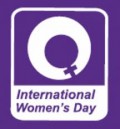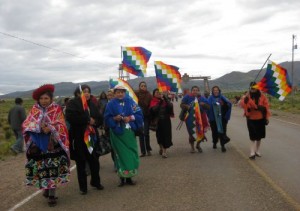 By Ioulia Fenton and Tracey Li.
By Ioulia Fenton and Tracey Li.
Every year, March 8 is a date reserved for honoring the fairer sex around the world. To celebrate some of the best the world has to offer, Development Roast brings you 8 organizations that are making a difference to the lives of Bolivia’s women. Happy international women’s day!
FIMI & MADRE Building Political Participation:

International Indigenous Women’s Forum (IIWF), which is best known by its Spanish name and acronym Foro Internacional de Mujeres Indígenas (FIMI), was founded in 2000. It is a network of indigenous women from all over the world that partners with another global women’s organization, MADRE, to increase the role of women in international decision making, improve women’s human rights, and build political participation of women in Bolivia. Together they work to enhance the skills of women in order to help them to enter the political process that they have traditionally been actively excluded from. Until the 1990s, for example, women’s involvement in Bolivia’s national and local politics was uncommon and generally unwelcome. However, the two organizations have seen great successes through the training they have provided to women in running political campaigns, gathering consensus, and addressing communities’ needs through the legislative process. In December 2009, for instance, the number of women elected to parliament doubled, rising from 14 to 28 percent. Six women who participated in the FIMI/MADRE workshops were elected. And in January 2010, a national conference of Indigenous Women Parliamentarians drew close to 100 participants from across Latin America Click here to learn more.
CFCA is Improving Food Security and Nutrition: The Change for Children Association (CFCA) is an organization that supports sustainable community development in Latin America, Africa, and the Caribbean. In Bolivia, CFCA has partnered with a group of entreprenurial and engaged indigenous Moseten women of Palos Blanco & Alto Beni Bolivia, (the primary agricultural producers in the area), to support their project that helps women produce more and better quality food. The project encourages individual producers to diversify their agricultural production and reduce food waste on their land, while at the same time promotes collective organizing for small-scale economic development. The food the women produce is then used at home and/or sold to an innovative school feeding program. This has the quadrouple effect of improving the women’s own food security, increasing their income, and improving the school children’s health and nutrition, who then go on to learn better and achieve greater results at school.

Womankind is Confronting Violence: Womankind is an international women’s human rights charity that has been building partnerships with local Bolivian women’s organizations since 2002. Their primary aim has been to improve women’s capacity to stand up against discrimination and domestic and other kinds of violence. They also work with the Bolivian government to help change mindsets and shift policies to include and prioritise women in decision making process. Click here to learn more about Womankind’s work in Bolivia.

‘Pro Mujer’ is Pioneering Women’s Empowerment in Latin America: Pro Mujer help women in Latin American countries to break out of the cycle of poverty by building livelihoods for themselves. The organization provides business training and microfinance as well as health care support, enabling women to financially support themselves and their families. It was founded in Bolivia in 1990 by school teachers Lynne Patterson (an American) and Carmen Velasco (Bolivian). Today Pro Mujer work in five Latin American countries including Bolivia, for which they have national coverage. The majority of Pro Mujer’s Bolivian clients live in small cities and are involved in commercial activities, such as selling goods produced in home-based businesses.
‘Casa de la Mujer’ is Defending Women’s Rights and Fighting for Sexual Equality: Casa de la Mujer  (Women’s House) is a private institution for social development. Their goal is to achieve sexual equality in society, enabling women of all classes and ethnicities to participate in all aspects of Bolivian life. They have a particular focus on eliminating violence against women. To promote their work and ideals they have a radio station, Radio Alternativa, which features a women’s magazine in addition to news and entertainment programs.
(Women’s House) is a private institution for social development. Their goal is to achieve sexual equality in society, enabling women of all classes and ethnicities to participate in all aspects of Bolivian life. They have a particular focus on eliminating violence against women. To promote their work and ideals they have a radio station, Radio Alternativa, which features a women’s magazine in addition to news and entertainment programs.
 ‘Asociación Mujeres en Acción’ is Improving the Lives of Women from Rural Areas Through Social Programs: the Bolivian ‘Women in Action’ Association was founded in 2008 with the goal of implementing projects to enable women to improve the quality of their own lives, and that of their families. The association’s work is aimed at women from rural areas and includes activities such as workshops on how to produce goods which can be sold at local fairs (e.g. traditional cakes). They also organize social events to enable women to meet each other and share ideas.
‘Asociación Mujeres en Acción’ is Improving the Lives of Women from Rural Areas Through Social Programs: the Bolivian ‘Women in Action’ Association was founded in 2008 with the goal of implementing projects to enable women to improve the quality of their own lives, and that of their families. The association’s work is aimed at women from rural areas and includes activities such as workshops on how to produce goods which can be sold at local fairs (e.g. traditional cakes). They also organize social events to enable women to meet each other and share ideas.
The ‘Instituto de Formación Femenina Integral’ is Encouraging Women to Have Their Say in Local Policy-Making: the Institute for Women’s Training is  over 30 years old and is based in Cochabamba. Their aim is to motivate women in the local area to actively participate in making decisions which affect the community, such as those affecting food security and the development of the local economy. The institute also promotes the organization of, and participation in, political petitioning for women’s rights.
over 30 years old and is based in Cochabamba. Their aim is to motivate women in the local area to actively participate in making decisions which affect the community, such as those affecting food security and the development of the local economy. The institute also promotes the organization of, and participation in, political petitioning for women’s rights.

Ipas is Preventing Deaths and Disabilities Caused by Unsafe Abortion: Ipas’ motto is ‘Health. Access. Rights.’ They believe that every woman has the right to manage her fertility and to access safe reproductive health care, including safe abortion care. In Bolivia, Ipas works to improve women’s access to reproductive health care and to prevent sexual violence. In 2010 they co-organized a large community event which resulted in the alliance of 130 indigenous women leaders. These women then made a national declaration affirming the sexual and reproductive rights of all Bolivian women, including the right to safe, legal abortion. Ipas is also working with the Bolivian government to call greater attention to sexual violence and to change the legal system to help the victims of such violence.
Like this article? Sign up at the top of this page for email updates.
Ioulia Fenton is a researcher with INESAD. Tracey Li is an intern with INESAD.
 Development Roast Giving international development a proper roasting
Development Roast Giving international development a proper roasting



One comment
Pingback: Graphics: Bolivia tops Violence Against Women in Latin America chart. | Development Roast